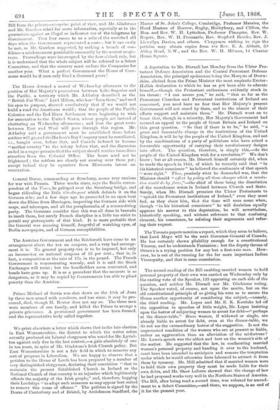The second reading of the Bill enabling married women to
hold personal property of their own was carried on Wednesday only by the casting vote of the Speaker, 123 appearing on each side of the question, and neither Mr. Disraeli nor Mr. Gladstone voting. The Speaker voted, of course, not upon the merits, but on the old constitutional principle of so giving his vote as to secure the House another opportunity of considering the subject,—namely, the third reading. Mr. Lopes and Mr. E. K. Kerslake led off the opposition in speeches of little weight, Mr. Lopes insisting upon the horror of subjecting women to arrest for debt—" perhaps at the dinner-table." Since women, if widowed or single, are already liable to arrest for debt, even at the dinner-table, we do not see the extraordinary horror of the suggestion. Is not the unprotected condition of the women who are at present so liable, rather an aggravation than an alleviation of the misfortune ? Mr. Lowe's speech was the ablest and best on the women's side of the matter. He suggested that the law, in confiscating married women's personal property and handing it over to the husband, must have been intended to anticipate and remove the temptation under which he would otherwise have laboured to extract it from them by tyranny. Mr. Mill admitted that if married women were to hold their own property they must be made liable for their own debts, and Mr. Shaw Lefevre showed that the change of law he had proposed works very well in the Northern States of America. The Bill, after being read a second time, was referred for amend- ment to a Select Committee,—and there, we suppose, is an end of it for the present year.






























 Previous page
Previous page